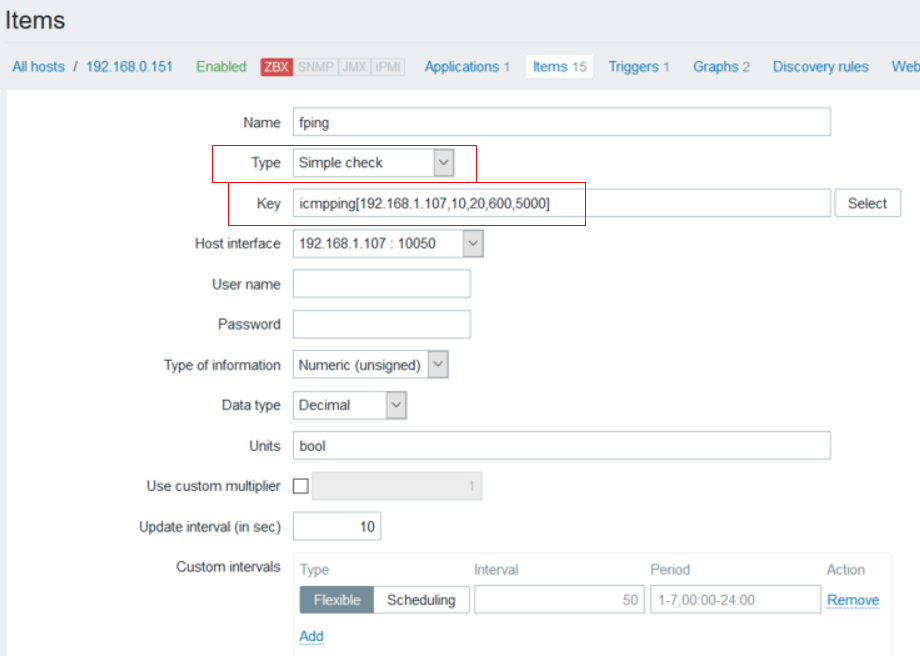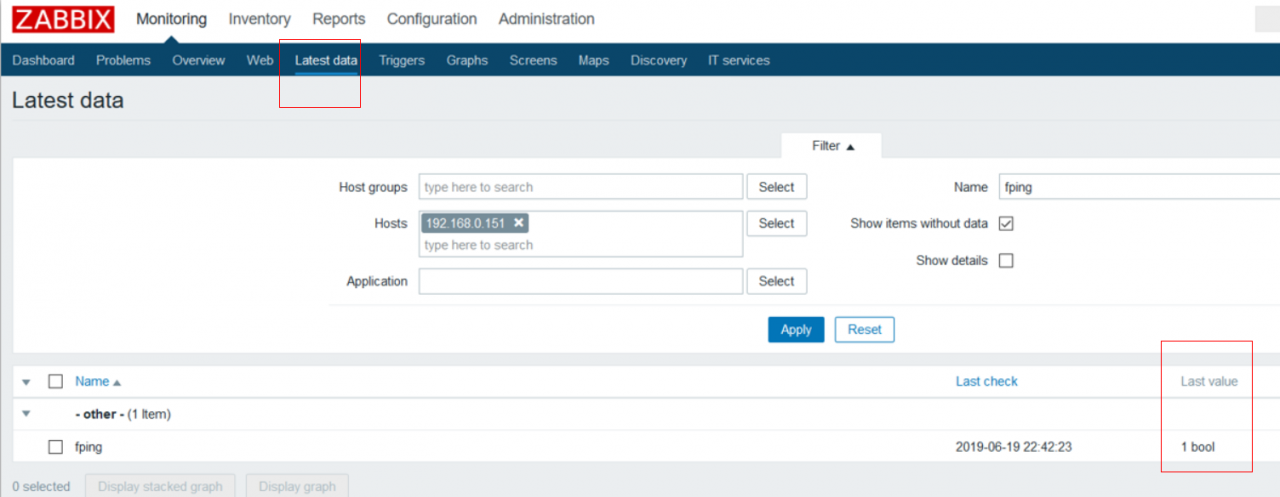Start
simple checks is usually used to check remote services that do not have agents or clients installed. Using simple checks, the monitored client does not need to install the ZABBIX
agent client. The ZABBIX server directly uses simple checks to collect the receipt data, which is basically used to detect whether a port of the remote server is listening
or not.
Simple checks are as follows:
simple checks net.tcp.service [ftp,,155]
net.tcp.service [http]
net.tcp.service .perf[http,,8080]
To use basic detection to monitor the VMware server, you need to fill in the user and password fields, and other servers can be ignored
Basic testing
The following is a list of basic tests supported by zabbx
| Key | ||||
| description | return value | parameters | Comments | |
| icmpping[<target&>,<packets&>,<interval&>,<size&>,<timeout&>] | ||||
| check whether icmping is supported or not | 0 – ICMP Ping failed 1 – ICMP Ping succeeded | target – host IP or domain name packets – number of packets interval – time interval between consecutive packets, in milliseconds size – packet size, in bytes timeout – timeout, in milliseconds | For example: icmping [, 4] – as long as one of the four packages returns, 1 see also details of processing ICMP pings will be returned | |
| icmppingloss[<target&>,<packets&>,<interval&>,<size&>,<timeout&>] | ||||
| Return percentage | Packet loss rate | <>
| Please refer to details of processing ICMP pings |
| |
| icmppingsec[<target&>,<packets&>,<interval&>,<size&>,<timeout&>,<mode&>] | ||||
| Return ICMP response time | Seconds | target – host IP or domain name packets – number of packets interval – packet response time, in milliseconds size – packet size, in bytes timeout – timeout, in milliseconds mode – min, Max, AVG (default value) | . if the host is not available, such as hang up, it will return 0 | |
| net.tcp.service [service,<ip&>,<port&>] | ||||
| Check whether the service is running and accepting TCP connection | 0 – service not opened 1 – service running | Service – one of SSH, NTP, LDAP, SMTP, FTP, HTTP, pop, NNTP, IMAP, TCP, HTTPS, telnet IP – port defined in ZABBIX (standard service port) | Example: net.tcp.service [FTP,, 45] check whether the FTP service running on port 45 is available. The imap993 port and pop995 port of encryption protocol do not support ZABBIX 2.0, and support HTTPS and telnet | |
| net.tcp.service .perf[service,<ip&>,<port&>] | ||||
| Test server performance | 0 – service stopped sec – time to connect to the server (seconds) | Service – one of SSH, NTP, LDAP, SMTP, FTP, HTTP, pop, NNTP, IMAP, TCP, HTTPS, telnet IP – IP defined in ZABBIX port – port (standard port number) |
for example: net.tcp.service Note that with TCP Service indicating the port is mandatory |
Timeout processing
if the basic detection time exceeds the supermarket time set by ZABBIX configuration file, ZABBIX will not process
3. ICMP pings
ZABBIX uses the external command fly to handle ICMP Ping. Fping is not included in the ZABBIX distribution. You need to download and install it additionally. If you configure the EPEL source, you can install it with the following command
[root@localhost ~]# yum install fping
Loaded plugins: fastestmirror, langpacks
Loading mirror speeds from cached hostfile
* base: mirrors.163.com
* extras: mirrors.163.com
* updates: mirrors.163.com
base | 3.6 kB 00:00:00
extras | 3.4 kB 00:00:00
google-chrome | 1.3 kB 00:00:00
opera | 2.9 kB 00:00:00
updates | 3.4 kB 00:00:00
zabbix | 2.9 kB 00:00:00
zabbix-non-supported | 951 B 00:00:00
Package fping-3.10-1.el7.x86_64 already installed and latest version
Nothing to doThen modify ZABBIX_ server.conf , specify the fping path, and the configuration parameter is fpinglocation, generally
FpingLocation=/usr/sbin/fpingIf fping is not installed or the fping path is specified incorrectly, cmping, icmppinglass, icmppingsec will not process it. The ZABBIX user who executes the fping command needs to set setuid. After all, the fping command requires root permissions, as follows:
ICMP detection default parameters:
| parameters | value | description | fping flag | Min | Max |
| packets | 3 | Number of packages | -C | 1 | 10000 |
| interval | 1000 | Milliseconds, fping default | -p | 20 | |
| size | 56 or 68 | Byte, “fping” default; x86 uses 56 bytes, x86_ 64 uses 68 bytes | -b | 24 | 65507 |
| timeout | 500 | Milliseconds, fping default | -t | 50 |
If you use simple checks
For the first time, you can test whether you can use the fping command
[root@localhost ~]# fping 192.168.1.107
192.168.1.107 is aliveWhen creating an item, select simple check as the type, then select the corresponding key as the key and fill in the corresponding parameters.

You can see  in lastest data
in lastest data